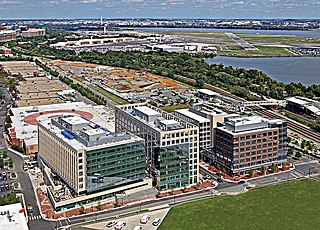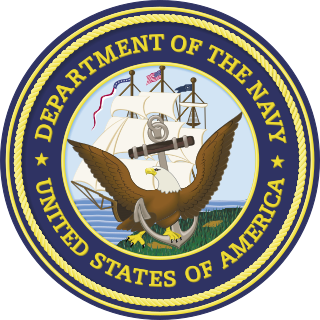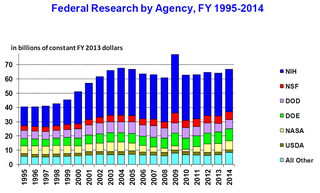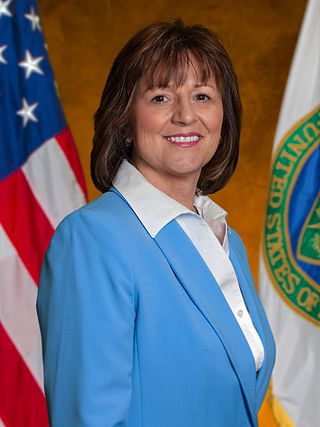James H. Korris, a pioneer of the current trend in game-based simulation for military training, served as Creative Director of the Institute for Creative Technologies (Institute), University of Southern California (USC) in Los Angeles from its founding in August 1999 until October 2006. Dubbed "The Military Entertainment Complex", the modern collaboration of Hollywood and the Department of Defense at the institute was first discussed in a National Research Council study published in 1997. At the institute, Korris worked with talents as diverse as John Milius, Randal Kleiser and David Ayer The initial $44.5 million contract grew substantially as basic research in immersive virtual reality and prototype application development was expanded.
The Central Florida Research Park (CFRP) is a research park abutting the main campus of the University of Central Florida (UCF) in Orlando, Florida, United States. CFRP is the largest research park in Florida, the fourth largest in the United States by number of companies, and the seventh largest in the United States by number of employees. CFRP is home to numerous centers hosted by the United States Department of Defense, UCF, and private corporations.

The Institute for Creative Technologies (ICT) is a University Affiliated Research Center at the University of Southern California located in Playa Vista, California. ICT was established in 1999 with funding from the US Army.

The Institute for Defense Analyses (IDA) is an American non-profit corporation that administers three federally funded research and development centers (FFRDCs) – the Systems and Analyses Center (SAC), the Science and Technology Policy Institute (STPI), and the Center for Communications and Computing (C&C) – to assist the United States government in addressing national security issues, particularly those requiring scientific and technical expertise. It is headquartered in Alexandria, Virginia.
Virtual Heroes, Inc. is a developer of serious games in Raleigh, North Carolina, United States. It was founded in 2004.

The Naval Air Warfare Center Training Systems Division (NAWCTSD) is an Echelon IV command of the United States Navy, reporting to the Commander, Naval Air Warfare Center - Aircraft Division (NAWCAD) at NAS Patuxent River, Maryland. NAWCTSD is located in Orlando, Florida in the Central Florida Research Park, adjacent to the University of Central Florida (UCF). The facility is a part of a larger military installation within the Central Florida Research Park known as Naval Support Activity Orlando.
The United States Army DEVCOM Ground Vehicle Systems Center (GVSC) (formerly United States Army Tank Automotive Research, Development and Engineering Center (TARDEC)), located in Warren, Michigan, is the United States Armed Forces' research and development facility for advanced technology in ground systems. It is part of the U.S. Army Combat Capabilities Development Command (DEVCOM), a major subordinate command of the U.S. Army Futures Command. GVSC shares its facilities with the United States Army Tank-automotive and Armaments Command (TACOM). Current technology focus areas include Ground Vehicle Power and Mobility (GVPM), Ground System Survivability and Force Protection, among others.
Purdue University's Synthetic Environment for Analysis and Simulations, or SEAS, is currently being used by Homeland Security and the US Defense Department to simulate crises on the US mainland. SEAS "enables researchers and organizations to try out their models or techniques in a publicly known, realistically detailed environment." It "is now capable of running real-time simulations for up to 62 nations, including Iraq, Afghanistan, and China. The simulations gobble up breaking news, census data, economic indicators, and climactic events in the real world, along with proprietary information such as military intelligence. [...] The Iraq and Afghanistan computer models are the most highly developed and complex of the 62 available to JFCOM-J9. Each has about five million individual nodes representing things such as hospitals, mosques, pipelines, and people."

Virginia Modeling, Analysis and Simulation Center (VMASC) is a multi-disciplinary research center of Old Dominion University. VMASC supports the University’s Modeling & Simulation (M&S) degree programs, offering M&S Bachelors, Masters and Ph.D. degrees to students across the Colleges of Engineering and Technology, Sciences, Education, and Business. Working with more than one hundred industry, government, and academic members, VMASC furthers the development and applications of modeling, simulation and visualization as enterprise decision-making tools to promote economic, business, and academic development.
The United States Department of Defense High Performance Computing Modernization Program (HPCMP) was initiated in 1992 in response to Congressional direction to modernize the Department of Defense (DoD) laboratories’ high performance computing capabilities. The HPCMP provides supercomputers, a national research network, high-end software tools, a secure environment, and computational science experts that together enable the Defense laboratories and test centers to conduct research, development, test and technology evaluation activities.

The National Center for Simulation (NCS) is an association of defense companies, government, academic, start-up companies, and industry members. NCS is located in the Central Florida Research Park, adjacent to Naval Support Activity Orlando, and the simulation headquarters of the Army, Navy, Marine Corps, Air Force, and the University of Central Florida in Orlando, Florida, USA.
Dylan Schmorrow is an American scientist and retired United States Defense Official. He is currently the chief scientist at Soar Technology, Inc.. He is a retired US Navy captain, and served as the deputy director of the Human Performance, Training, and BioSystems Research Directorate at the Office of the Assistant Secretary of Defense, Research & Engineering at Office of the Secretary of Defense. He was also specialty leader of the Aerospace Experimental Psychologist community and an acquisition professional in the Naval Acquisition Corps.
Modeling and simulation (M&S) is the use of models as a basis for simulations to develop data utilized for managerial or technical decision making.
A dynamic terrain is the representation of terrain together with the capability for modification during a simulation.
The Institute for Simulation and Training (IST) is a research institute of the University of Central Florida located in Orlando, Florida, United States. Grace Bochenek was appointed director of IST in early 2021. She was previously the director of the U.S. Army Tank Automotive Research, Development and Engineering Center (2006-12) and the chief technology officer of the U.S. Army Materiel Command, and served as acting secretary of energy for the U.S. Department of Energy (2017).

The United States Army Simulation and Training Technology Center (STTC) provides the United States Department of Defense and United States Department of Homeland Security, with applied research to develop simulation technologies, build on current simulation knowledge, and understand system of systems environments where human, agent, and teams are involved.
Mounted Warfare TestBed (MWTB) at Fort Knox, Kentucky, was the premier site for distributed simulation experiments in the US Army for over 20 years. It used simulation systems, including fully manned virtual simulators and computer-generated forces, to perform experiments that examined current and future weapon systems, concepts, and tactics.

The science policy of the United States is the responsibility of many organizations throughout the federal government. Much of the large-scale policy is made through the legislative budget process of enacting the yearly federal budget, although there are other legislative issues that directly involve science, such as energy policy, climate change, and stem cell research. Further decisions are made by the various federal agencies which spend the funds allocated by Congress, either on in-house research or by granting funds to outside organizations and researchers.
Military Open Simulator Enterprise Strategy (MOSES) is a U.S. Army project evaluating the ability of OpenSimulator to provide independent and secured access to a virtual world.

Grace Marie Bochenek is an American industrial engineer and the current director of the School of Modeling, Simulation and Training, and the Institute for Simulation and Training at the University of Central Florida. She is former Director of the National Energy Technology Laboratory within the United States Department of Energy's Office of Fossil Energy. She also served as the acting United States Secretary of Energy in early 2017. She previously had spent much of her career at the U.S. Army Tank Automotive Research, Development and Engineering Center.








